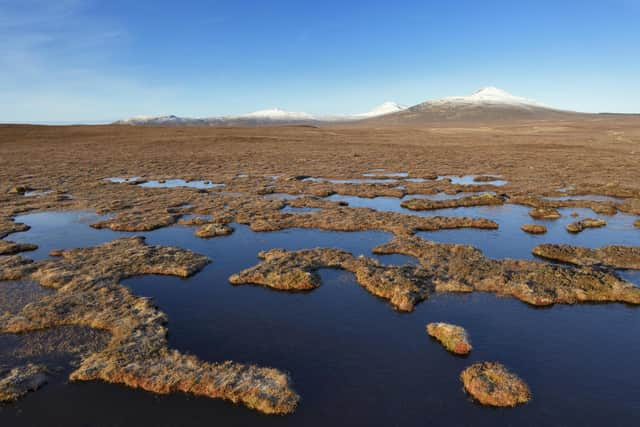Unesco World Heritage status ambition comes a step closer for Scotland's globally important Flow Country peatlands
The Flow Country, a vast area of blanket bog that spreads across 190,000 hectares of Caithness and Sutherland in Scotland’s far north, is estimated to store some 400 million tonnes of carbon – more than all the UK’s forests and woodlands combined – and supports a vast range of wildlife.
The team behind the campaign say gaining the highest protection for the site is an issue of national and international importance because of its environmental value.
Advertisement
Hide AdAdvertisement
Hide AdIt is hoped achieving the accolade will also bring educational, social and economic benefits to the area.
The site passed stage one of the nomination process in 2020.
To support the bid, a team of independent scientific experts has just completed a series of assessments to determine how the habitat might respond to climate change impacts over the next three decades.
Their findings are considered “hugely significant” in boosting the case to the United Nations, which if successful would see the Flow Country become the world’s first peatland to be inscribed on the World Heritage list.


The Flow Country Partnership, a consortium that includes local and national government agencies, environmental groups, academics and land managers, is working to help prepare the bid, which will be submitted to Unesco by the UK government later this year.
Dr Steven Andrews, World Heritage Project co-ordinator for the partnership, said: “Outputs from the initial workshop confirmed that while the Flow Country overall was in good condition, some changes have occurred and there is reason to be concerned about the effects of recent climatic trends.
“We now have a better idea of how, over time, changes in temperature and rainfall can damage areas of the Flow Country, particularly if they increase the risk of wildfires.
“On a more positive note, it was highlighted that the Flow Country peatland is a highly resilient ecosystem if cared for appropriately.


Advertisement
Hide AdAdvertisement
Hide Ad“Our hope is that by securing Unesco World Heritage Site status for it, we can do more to protect this vital area and the culture and livelihoods it sustains for future generations.”
The scientists, from James Cook University in Australia, used the Climate Vulnerability Index (CVI) to quantify risks to the landscape and predict how it might respond to rising temperatures and increasingly extreme weather over the next three decades.
Funded the Royal Society of Edinburgh, the work was led by Professor Scott Heron from James Cook University’s College of Science & Engineering and lead developer of the CVI – a method usually reserved for analysing sites which have already achieved World Heritage status.


He said: “For the first time we’ve applied part of the process to look at climate risks for a nomination, workshopping the CVI in collaboration with the Flow Country Partnership to help identify likely climate impacts over the next 30 years.”
The outcome of the bid will not be announced until 2024, but if successful the Flow Country would join other renowned Scottish landmarks such as St Kilda, Skara Brae and the Forth Bridge on the list, but would be Scotland’s only mainland property designated for purely natural criteria.
Highland Council, NatureScot, RSPB Scotland and Wildland are funding the project.
Comments
Want to join the conversation? Please or to comment on this article.
